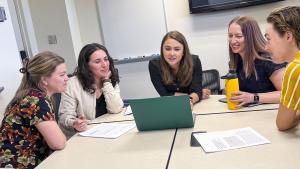School of life sciences assistant professor ahead of the curve in efforts to promote inclusivity in science
Assistant professor Katelyn Cooper, who joined the School of Life Sciences at ASU in 2020, is proving that big risks lead to big rewards. Cooper, a biology education researcher, has built her lab on studying undergraduate and graduate mental health in the sciences, despite the topic not always being well-received. “When I started this work in 2017, it was difficult to get the science community to embrace research on student anxiety and depression. The most common response to my research was, ‘Everyone has these feelings, students just need to learn how to push through.’” Despite skepticism and even opposition at times about the importance of science student mental health, Cooper hedged her bets and chose to continue this line of research; she is now responsible for a foundational body of work that explains how different biology learning environments, such as research experiences, online classrooms, and active learning courses, affect student anxiety and depression.
Cooper’s decision was a good one. Over the past few years, the science community began taking more notice of mental health as national reports revealed worsening anxiety and depression among undergraduate and graduate students. In fact, just this year two of Cooper’s lines of research, one on mental health in scientific research and the other on mental health in active learning were highlighted in Science, one of the world’s most distinguished scientific journals. Shortly after, Cooper received the prestigious National Science Foundation (NSF) CAREER Award, recognizing her as one of the nation’s most promising young faculty members and supporting her research aimed at examining the relationship between undergraduate and graduate research and depression.
The nation’s brightest undergraduates are choosing to come to ASU to study with Cooper. In fact, all five of the graduate students whom Cooper has trained have received the NSF GRFP, a fellowship supporting outstanding graduate researchers. “The National Science Foundation has been incredibly supportive of our work,” says Cooper. “This year, three of my graduate students wrote fellowship applications proposing research projects aimed at understanding the relationship between mental health and education. All three were funded, which really demonstrates how far we’ve come as a scientific community.”
What’s next for Cooper? She has received national funding to develop online single-session interventions to promote undergraduate and graduate mental health at scale, which she will be working on in collaboration with clinical psychologists. In addition to her primary line of research on mental health, Cooper also works with the Research for Inclusive STEM Education Center to study how to create more inclusive biology learning environments for LGBTQ+ students. This month she was listed among the 2022 NBC PRIDE 30: The new generation, a list of 30 leaders, creators, and newsmakers creating positive change in the LGBTQ+ community. “It has been an exciting couple of years,” said Cooper. “I feel really fortunate to be at an institution such as ASU whose mission- to be defined by whom we include, not by whom we exclude- aligns so well with my research.”
